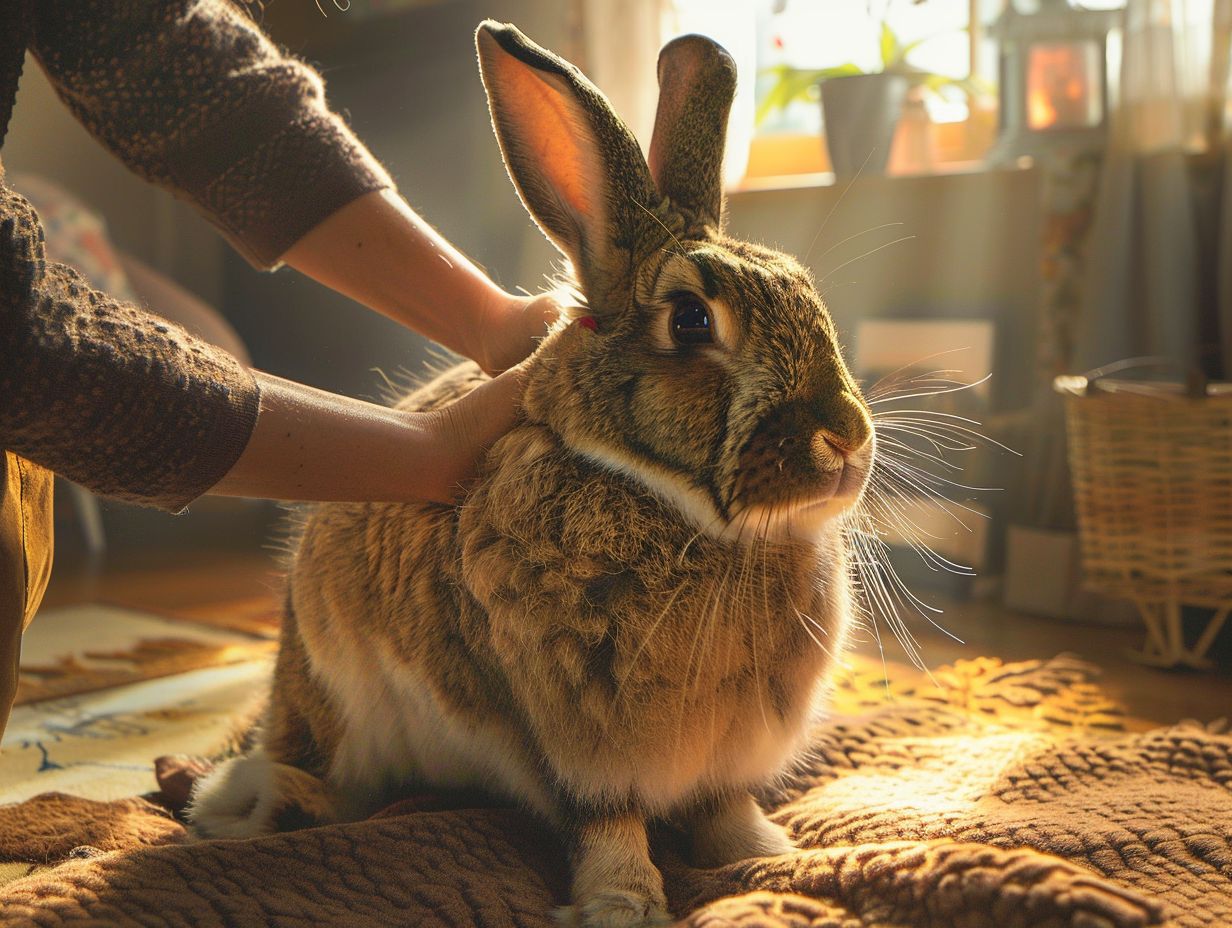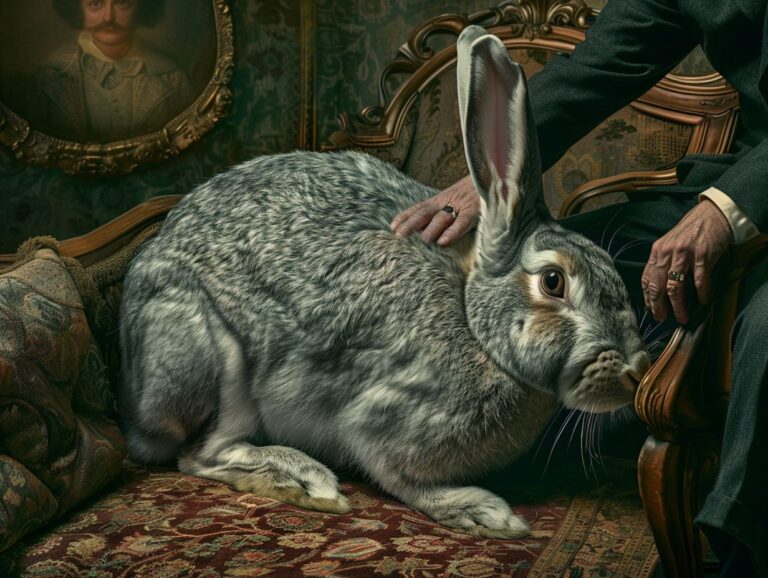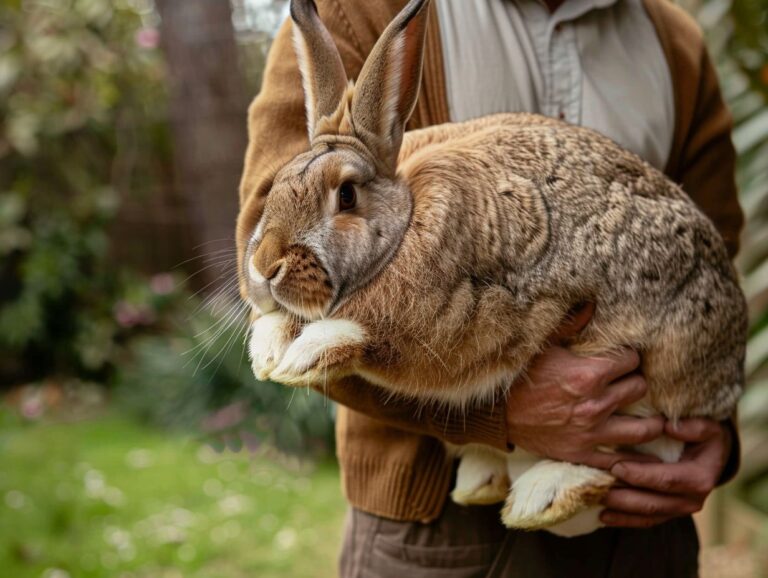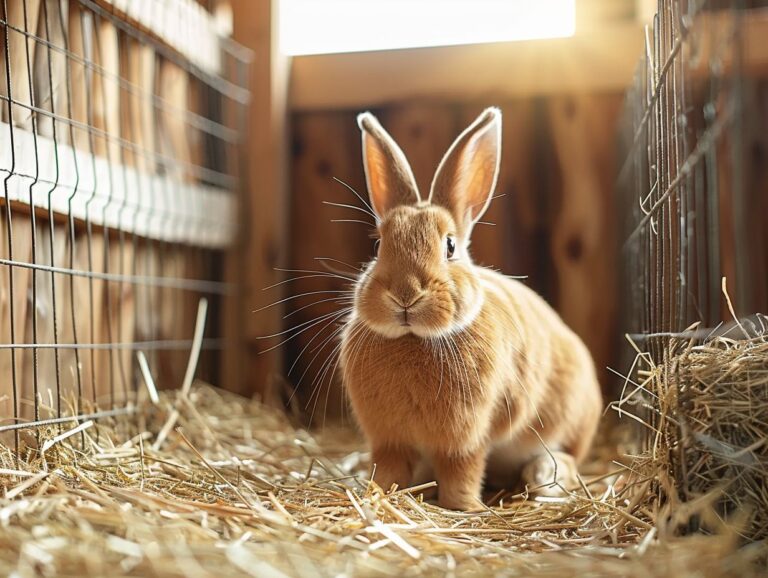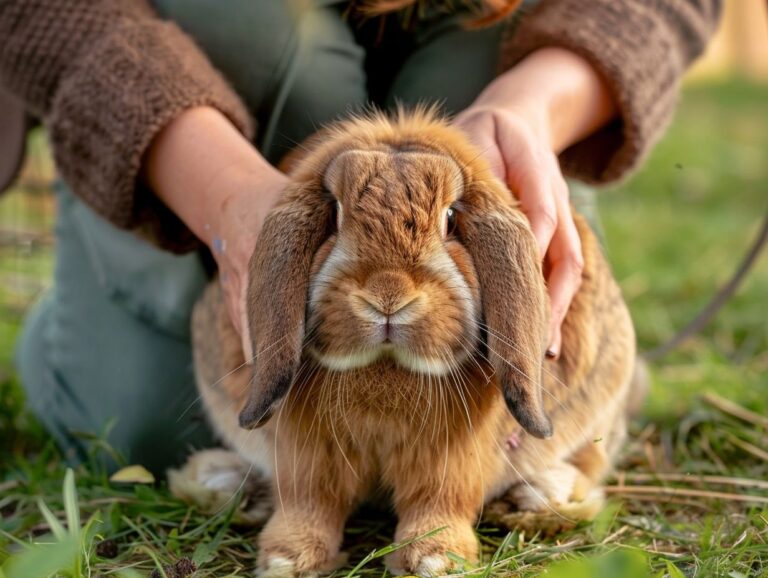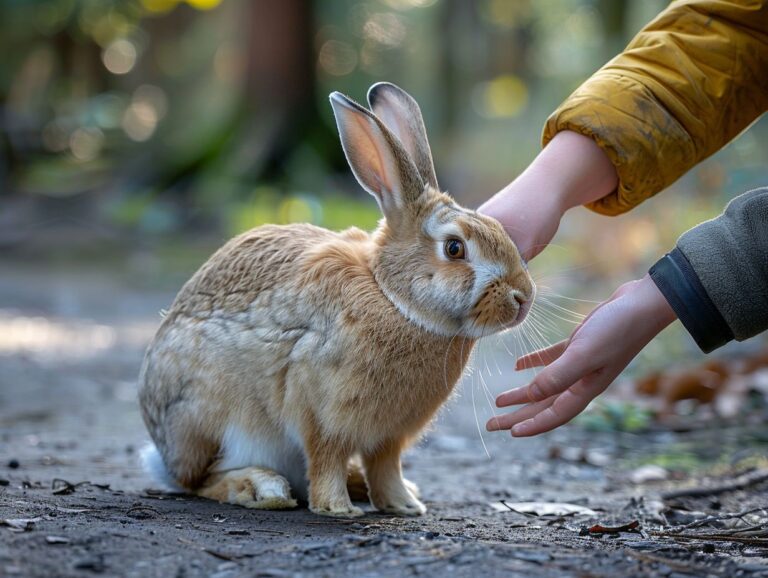New Zealand Rabbits As Pets: Care, Diet, and Health For Large Sized Breeds
Considering getting a New Zealand rabbit as a pet?
These large-sized rabbit breeds are known for their unique characteristics and care requirements.
From the right size of cage to the suitable diet and common health concerns, there are important factors to consider before bringing one home.
We will explore everything you need to know about caring for a New Zealand rabbit, including grooming requirements, bonding tips, and exercise needs.
Find out if a New Zealand rabbit is the right pet for you!
Key Takeaways:
What are Large Sized Rabbit Breeds?
Large-sized rabbit breeds are known for their impressive size and unique characteristics compared to smaller rabbit breeds. These giant rabbits often weigh between 9 to 11 pounds, making them a substantial presence in any rabbitry or household.
One notable breed in the large rabbit category is the Flemish Giant, which can weigh up to 22 pounds or more, towering over other breeds with their massive bodies and gentle demeanor. Another popular choice is the Continental Giant, known for its sleek appearance, long ears, and friendly nature, making them great companions for families.
The French Lop, with its distinctive drooping ears and muscular build, is another beloved breed among rabbit enthusiasts, prized for its playful and affectionate temperament. The Giant Chinchilla, characterized by its dense fur and vibrant coloration, is also favored as a show rabbit due to its striking appearance.
What are the Common Characteristics of Large Sized Rabbit Breeds?
Large-sized rabbit breeds share common characteristics such as their docile personalities, distinctive appearance, and unique physical characteristics that set them apart from smaller rabbit breeds.
One of the notable traits of large rabbit breeds is their friendly and gentle nature. They are known to be sociable and enjoy human interaction, making them great pets for families. In terms of appearance, these rabbits typically have robust bodies, strong legs, and a majestic posture that commands attention.
Their size alone makes them stand out among other rabbits. Giant rabbits often have long ears that proportionately complement their large bodies. Some breeds exhibit striking colors and unique markings that enhance their allure, making them a delight to look at. If you are considering tan rabbits as pets, it is essential to understand their care, diet, and health requirements for small breeds.
Physically, these rabbits also tend to have powerful hind legs, which give them impressive agility and jumping abilities despite their size. Their fur is usually dense and plush, providing them with protection and insulation against various weather conditions.
What to Consider Before Getting a New Zealand Rabbit as a Pet
Before deciding to bring a New Zealand rabbit into your home as a pet, several factors need consideration to ensure a suitable environment for both the rabbit and its human companions, especially if there are children in the household.
When introducing a New Zealand rabbit into a family setting, it’s essential to evaluate the compatibility of these gentle creatures with young ones. These rabbits are generally affectionate and tolerant, making them ideal companions for kids when supervised properly. Teaching children about the importance of gentle handling and respect for the rabbit’s space is crucial for a harmonious relationship. Establishing a routine for feeding, grooming, and veterinary care is essential in maintaining the health and well-being of these pets.
What is the Right Size of Cage for a Large Sized Rabbit Breed?
Choosing the right size of cage for a large-sized rabbit breed is crucial to provide adequate space for the rabbit to move around, stretch, and exhibit natural behaviors.
Large-sized rabbit breeds require spacious cages to ensure their physical and mental well-being. A spacious cage allows the rabbit to hop, run, and perform its natural behaviors comfortably. The cage should not only be roomy but also well-ventilated to maintain proper air circulation and prevent respiratory issues.
Ensuring ample space is not just about physical health but also mental stimulation. Enrichment opportunities such as tunnels, toys, and platforms should be integrated into the cage setup to keep the rabbit active and engaged. Providing a stimulating environment within the cage is essential for the overall welfare of large rabbit breeds.
What Type of Diet is Suitable for Large Sized Rabbit Breeds?

Large-sized rabbit breeds require a balanced diet consisting of high-quality hay, fresh vegetables, and a limited amount of pellets to ensure optimal nutrition and overall health.
Hay is a crucial component of a rabbit’s diet as it provides necessary fiber for their digestive system, keeps their teeth healthy, and prevents gastrointestinal issues.
- Vegetables like leafy greens, carrots, and bell peppers offer essential vitamins and minerals, promoting overall wellbeing.
- Fruits should be given sparingly due to their high sugar content, serving as occasional treats.
Pellets specially formulated for rabbits are essential for providing concentrated nutrients, but they should be fed in moderation to avoid obesity.
What are the Common Health Concerns for Large Sized Rabbit Breeds?
Large-sized rabbit breeds are prone to certain health problems and diseases that require proactive monitoring, regular veterinary check-ups, and a well-maintained living environment to prevent potential health issues.
Common health concerns in large rabbit breeds include obesity, dental issues, and musculoskeletal problems. Obesity can lead to various complications such as heart disease and joint problems. Dental problems often arise due to improper diet and can result in pain and difficulty eating. Musculoskeletal issues like arthritis can affect their mobility and overall well-being.
Early detection is crucial in managing these health issues. Regular check-ups with a rabbit-savvy veterinarian help identify any health problems before they escalate. Providing a balanced diet, ample exercise, and a safe living environment are vital in maintaining their health.
How to Properly Care for a New Zealand Rabbit
Properly caring for a New Zealand rabbit involves providing a safe and enriching environment, regular grooming sessions, and attentive care from pet parents to ensure the rabbit’s well-being and happiness.
As a responsible pet owner of a New Zealand rabbit, it’s crucial to establish a routine grooming schedule to keep their coat in optimal condition and prevent matting. Brushing their fur gently not only helps in maintaining their overall appearance but also promotes bonding between you and your rabbit. Ensure their living space is clean and spacious, offering them plenty of room to hop around and exercise for their physical well-being. Social interaction plays a significant role in a rabbit’s happiness, so spend quality time with them daily through gentle petting and playtime.
What are the Basic Needs of a New Zealand Rabbit?
Meeting the basic needs of a New Zealand rabbit involves providing access to fresh water, ample space for exercise and movement, a clean living environment, and appropriate shelter to ensure the rabbit’s comfort and well-being.
Water availability is crucial for a New Zealand rabbit’s health as it needs a constant supply to stay hydrated and maintain bodily functions. Ensuring a spacious environment is essential to promote their natural behaviors and prevent stress. It’s imperative to set up their living space with areas for feeding, resting, and using the bathroom.
Domestic rabbits are social animals, so it’s advisable to provide companionship or frequent interaction to prevent loneliness. Creating a safe and predator-proof enclosure or hutch is vital for their security and protection against outdoor elements.
What are the Grooming Requirements for a New Zealand Rabbit?
Maintaining the grooming needs of New Zealand rabbits is essential to ensure a healthy coat, clean fur, and overall well-groomed appearance that reflects their natural beauty and vitality.
Brushing is a crucial part of keeping a Dutch rabbits as pets‘ coat in top condition. Regular brushing helps prevent matting and reduces shedding, promoting a healthier coat overall. It’s recommended to brush them at least twice a week, using a soft-bristled brush to gently remove loose fur and dirt.
Another important aspect of grooming is nail trimming. Overgrown nails can cause discomfort and affect the rabbit’s mobility. Trimming their nails every 4-6 weeks is typically advised, being careful not to cut into the quick, which could cause bleeding and pain. Learn more about large rabbit pet care.
Plus brushing and nail trimming, ear cleaning is also essential. New Zealand rabbits are prone to ear infections, so it’s important to check their ears regularly for any signs of redness, swelling, or discharge. Using a damp cloth or cotton ball, gently wipe the inside of their ears to remove dirt and debris.
How to Bond with a New Zealand Rabbit as a Pet?

Patience is key when it comes to bonding with these gentle creatures. Spend time near your rabbit, allowing them to get familiar with your presence. Offer treats and speak softly to create a sense of security. Engage in activities like grooming or interactive play to build mutual trust. It is important to respect their boundaries and body language, as rabbits are sensitive animals. By approaching them with care and sensitivity, you can create a strong and lasting bond that will enrich both your lives.
What are the Common Behaviors of New Zealand Rabbits?
New Zealand rabbits exhibit a range of common behaviors such as digging, chewing, socializing, and exploring their environment, showcasing their curious and playful temperament that adds charm to their personality.
These rabbits are known for their sociable nature and tend to thrive in the company of other rabbits or even their human companions. They display remarkable intelligence, often solving puzzles and tasks with ease. Their interactive behaviors, such as binkying and flopping, reflect their joyous and content demeanor. New Zealand rabbits are also keen observers, closely watching their surroundings and reacting to changes with curiosity and agility.
What are the Social Needs of New Zealand Rabbits?
Addressing the social needs of New Zealand rabbits involves providing opportunities for social interaction, mental stimulation, and environmental enrichment to ensure their well-being and happiness in captivity.
New Zealand rabbits are naturally social animals, and to thrive, they require companionship and engagement. One key aspect of rabbit socialization involves introducing them to other rabbits in a gradual and controlled manner to prevent potential conflicts. Providing a spacious living environment with places to hide, explore, and play can enhance their mental well-being. It’s essential to incorporate interactive toys, tunnels, and platforms into their habitat to encourage physical activity and prevent boredom. Regular human interaction and gentle handling also play a vital role in building trust and ensuring a strong bond with these affectionate creatures.
What are the Exercise Requirements for New Zealand Rabbits?
New Zealand rabbits benefit from regular exercise opportunities that allow them to hop, run, and explore their surroundings, emphasizing the need for sufficient space, supervised playtime, and engaging activities to promote their physical health and mental stimulation.
Providing adequate space for New Zealand rabbits to roam and stretch their legs is crucial for their overall well-being. Setting up a designated play area or using a rabbit-proof pen can give them the freedom to move around safely. Incorporating interactive toys and challenges, such as tunnels, balls, or puzzle feeders, can keep them mentally stimulated and prevent boredom. Interactive playtime with their owners also fosters bonding and social interaction, which are essential for their emotional health. Variety in activities is key to maintaining their interest and ensuring they get the exercise they need.
Conclusion: Is a New Zealand Rabbit the Right Pet for You?
Deciding to welcome a New Zealand rabbit into your family as a pet requires careful consideration of their temperament, the commitment involved in their care, and the responsibilities that come with being a responsible pet parent.
New Zealand rabbits are known for their friendly and social nature, making them great companions for households seeking an interactive and affectionate pet.
It is important to create a suitable living environment for your New Zealand rabbit, which includes providing a spacious hutch or enclosure, ample room for exercise, and access to fresh hay and vegetables for their diet.
Potential pet parents should be prepared to devote time daily to interact with and groom their rabbit, as they thrive on human interaction and regular maintenance is essential for their well-being. Consider checking out this guide on medium-sized rabbit care.
Frequently Asked Questions
What are some common large sized breeds of rabbits that make good pets?
Some common large sized breeds of rabbits that make good pets include New Zealand rabbits, Flemish Giants, and French Lops.
What is the average size of a New Zealand rabbit?
The average size of a New Zealand rabbit is around 9 to 11 pounds, making them a great option for those looking for a larger pet rabbit.
What type of care does a New Zealand rabbit require?
New Zealand rabbits require daily care such as feeding, grooming, and exercise. They also need regular visits to the vet and a clean living space.
What should I feed my New Zealand rabbit?
A healthy diet for a New Zealand rabbit should consist of mostly fresh hay, along with a small amount of pellets and fresh vegetables. Treats should be given sparingly.
What are some common health issues for large sized rabbit breeds?
Some common health issues for large sized rabbit breeds include obesity, dental problems, and gastrointestinal issues. Regular checkups and a healthy diet can help prevent these issues.
Do New Zealand rabbits make good pets for families?
Yes, New Zealand rabbits can make great pets for families with children. They are social, gentle, and can be easily trained to use a litter box. However, supervision is always recommended when children are interacting with any pet.

